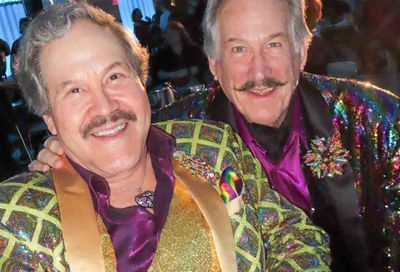From the Supreme Court Forward
What Was & What's Next for the Marriage Equality Movement
AMERICA’S EMBRACE
The pace at which America has embraced marriage equality has been nothing short of staggering. It’s easy to forget that it was less than a year ago President Barack Obama and much of the Democratic Party remained opposed to same-sex marriage.
“I believe that marriage is the union between a man and a woman. Now, for me as a Christian — for me — for me as a Christian, it is also a sacred union. God’s in the mix,” then-Sen. Obama said during a presidential campaign appearance at the Saddleback Presidential Forum in April 2008. Although Obama repeatedly said gay couples should be entitled to rights and benefits through civil unions, he maintained marriage is between a man and a woman.
But since Obama announced on May 9, 2012, that he believes “same-sex couples should be able to get married,” the number of other politicians who have followed has been overwhelming to even the most ardent supporters of marriage equality.
“Our journey is not complete until our gay brothers and sisters are treated like anyone else under the law – for if we are truly created equal, then surely the love we commit to one another must be equal as well,” Obama said during his second inaugural address, also citing the Stonewall riots, as the Supreme Court justices sat feet away.
More than half the country now supports same-sex marriage. According to a Washington Post-ABC News poll released a week prior to the Supreme Court arguments, 58 percent of Americans believe same-sex couples should have the right to marry, compared to 36 percent who oppose. The numbers were a near reversal compared to a decade ago, in 2003, when 37 percent supported same-sex marriage and 55 percent opposed. Among millennials, those aged 18 to 29, 81 percent now support marriage equality.
In the weeks leading up to the Supreme Court’s historic arguments in the Proposition 8 and DOMA cases, the number of politicians — particularly moderate Democrats — who have endorsed same-sex marriage has increased at such a pace they have ceased to gain headlines.
It began when Republican Sen. Rob Portman of Ohio announced a “change of heart” earlier in March and became the first Senate Republican to support marriage equality, after learning his son is gay. A few days after, former Secretary of State Hillary Clinton announced what many had long suspected: She, too, supports marriage equality.
And then, with the Supreme Court poised to consider whether same-sex couples in all 50 states have a constitutional right to marry, the flood began.
In little more than a week, Democratic Sens. Mark Begich (Alaska), Tom Carper (Del.), Bob Casey (Pa.), Tim Kaine (Va.), Kay Hagan (N.C.), Claire McCaskill (Mo.), Jon Tester (Mont.) and Mark Warner (Va.) all announced their support for same-sex marriage, primarily through statements on social-media platforms. That leaves – as of Metro Weekly deadline – only seven Democratic senators who have not stated support for same-sex marriage: Sens. Joe Donnelly (Ind.), Heidi Heitkamp (N.D.), Tim Johnson (S.D.), Mary Landrieu (La.), Joe Manchin (W.Va.), Bill Nelson (Fla.) and Mark Pryor (Ark.).
On April 2, Republican Sen. Mark Kirk (Ill.) announced his support for same-sex marriage, joining with Portman as the second Senate Republican to endorse marriage equality. “Our time on this Earth is limited, I know that better than most,” Kirk wrote on his blog. “Life comes down to who you love and who loves you back — government has no place in the middle.”
According to the Alaska Star, Alaska’s Republican Sen. Lisa Murkowski recently described her view on same-sex marriage much as Obama described his a year ago.
“The term ‘evolving view’ has been perhaps overused, but I think it is an appropriate term for me to use,” Murkowski said, signaling that she too may soon endorse same-sex marriage.
For those Democrats who have yet to declare their support, they are to the right of Portman, Kirk and former Vice President Dick Cheney on the issue.
The Republican Party itself has indicated a renewed attempt to be more inclusive toward those with differing views on same-sex marriage. In an interview with USA Today, Republican National Committee Chairman Reince Priebus said that while the GOP’s platform opposes same-sex marriage, the party does not “need to act like Old Testament heretics” and must “strike a balance between principle and grace and respect.”
The scramble to be on the ”right side of history” was not lost on the Supreme Court justices either. “As far as I can tell, political figures are falling over themselves to endorse your side of the case,” Chief Justice John Roberts said to Windsor’s attorney, Roberta Kaplan.
Some have welcomed these new allies to the LGBT fold, while others have criticized what they deem political opportunism. Portman, in particular, has faced criticism from some in the LGBT community for supporting same-sex marriage only after it directly impacted his family. But others, considering the Portman family’s journey on a more personal level, have pointed to the enduring words of one of the movement’s most iconic figures.
“Harvey Milk was right,” Sen. Tammy Baldwin (D-Wis.), the chamber’s only out member, told Metro Weekly. “Come out, come out wherever you are and that’s how you’re going to change the world.”
The Democratic Party’s decision to write support for marriage equality into its national party platform last summer, along with Obama’s support, has all but assured that no viable Democrat will be able to run for the party’s presidential nomination again without supporting same-sex marriage.
Indeed, the four most likely to seek the nomination in 2016 — Hillary Clinton, Joe Biden, Maryland Gov. Martin O’Malley and New York Gov. Andrew Cuomo — all support marriage equality. While less than a decade ago the most advocates could hope for were Democratic politicians to openly support civil unions, now it’s a lack of support for marriage rights that draws more – and negative – attention.
Same-sex marriage opponents have argued that this indicates the political power of the gay-rights movement and shows the court need not issue a sweeping ruling as this debate plays out in the states. Supporters, however, argue that while the influence of gay people has grown, they still face explicit discrimination in more than 30 states.
”Gay people have been targeted by ballot measures more than any other group in American history,” said Wolfson. In an exchange with Justice Sonia Sotomayor, Charles Cooper, who argued on behalf of Proposition 8 supporters, could not name any other rational basis outside of the marriage context for a state using sexual orientation as a factor to deny benefits or impose burdens.
No matter how the Supreme Court rules, it is clear that it’s no longer radical to believe gays and lesbians deserve full equality. However, while public opinion is clearly shifting at a pace few could have imagined less than a decade ago when President George W. Bush endorsed a constitutional amendment banning same-sex marriage and voters in 11 states defined marriage as between a man and a woman on Election Day in 2004, divisions remain.
Outside the hushed courtroom, on the National Mall, opponents of same-sex marriage rallied to preserve marriage as between a man and a woman.
”I’m a Republican,” said Gary Bauer, a former Reagan administration appointee and president of American Values, during a rally orchestrated by the National Organization for Marriage. ”Let me say to my party: If you bail out on this issue, I will leave the party, and I will take as many people with me as I possibly can!”
Support Metro Weekly’s Journalism
These are challenging times for news organizations. And yet it’s crucial we stay active and provide vital resources and information to both our local readers and the world. So won’t you please take a moment and consider supporting Metro Weekly with a membership? For as little as $5 a month, you can help ensure Metro Weekly magazine and MetroWeekly.com remain free, viable resources as we provide the best, most diverse, culturally-resonant LGBTQ coverage in both the D.C. region and around the world. Memberships come with exclusive perks and discounts, your own personal digital delivery of each week’s magazine (and an archive), access to our Member's Lounge when it launches this fall, and exclusive members-only items like Metro Weekly Membership Mugs and Tote Bags! Check out all our membership levels here and please join us today!




















